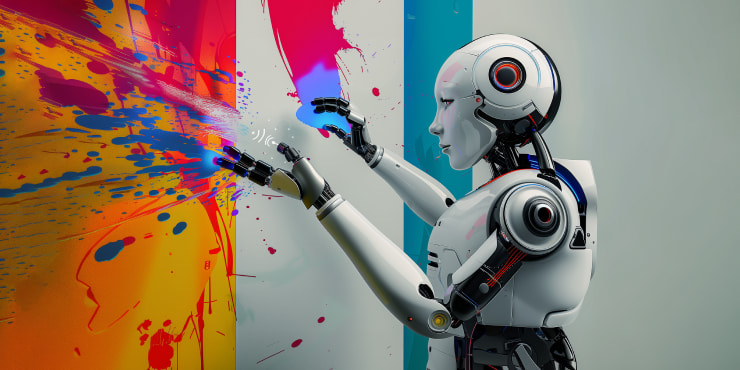The advent of AI in digital marketing design is reshaping how businesses approach their marketing strategies. By integrating AI into design processes, companies are able to create more personalized, efficient, and impactful marketing campaigns. This transformation is not only enhancing the way brands engage with their audiences but also redefining the creative process itself.

What is AI in Digital Marketing Design?
AI in digital marketing design refers to the use of artificial intelligence technologies to enhance the creation, customization, and delivery of marketing materials. AI tools can analyze vast amounts of data, identify trends, and automate design tasks, making it easier for marketers to produce content that resonates with their target audience.
The Role of AI in Personalizing Marketing Strategies
AI enables marketers to tailor their strategies to individual consumer preferences. By analyzing user data, AI can predict future behaviors and suggest personalized content. This level of customization was previously unattainable, but with AI, marketers can deliver targeted messages that increase engagement and conversion rates.
Data Analysis and Consumer Insights
AI tools can process large datasets to uncover consumer insights. By understanding consumer behavior patterns, marketers can create more effective campaigns. For more information on how AI is used to predict design trends, check out Predict Design Trends.
Automation of Design Tasks
AI can automate repetitive design tasks, freeing up creative teams to focus on innovation. This includes tasks such as image resizing, format conversions, and even basic design elements. AI tools like those found at Fotor AI Design are making this process more efficient.
AI-Driven Creative Processes
The integration of AI in creative processes is allowing for more innovative design solutions. Neural networks, for instance, are being used to generate unique design elements based on predefined parameters. Learn more about this in our article on Neural Networks in Design.
Generative Design
Generative design uses AI algorithms to explore a vast array of design possibilities. This approach allows designers to experiment with multiple options quickly and efficiently, leading to more innovative outcomes.
Enhanced User Experience
AI enhances user experience by ensuring that design elements are optimized for usability. Tools that incorporate AI can adapt design layouts based on user interactions, providing a more intuitive experience.
AI in Visual Content Creation
Visual content is a cornerstone of digital marketing, and AI is playing a significant role in its creation. From generating images to editing videos, AI tools are providing marketers with powerful capabilities.
AI for Image Generation
AI tools can create high-quality images tailored to specific marketing needs. These tools analyze current trends and audience preferences to produce visuals that capture attention. Explore more at AI Graphic Design Tools.
Video Editing and Production
AI is revolutionizing video production by automating editing processes and suggesting enhancements based on viewer engagement data. This results in more engaging and effective video content.
Challenges and Considerations
While AI offers numerous benefits, it also presents challenges. Ethical considerations, data privacy concerns, and the need for skilled professionals to manage AI tools are important factors to consider.
Ethical Implications
The use of AI in marketing raises ethical questions about data usage and consumer privacy. Marketers must ensure that their AI strategies comply with regulations and respect user consent.
Skilled Workforce
As AI becomes more prevalent, the demand for skilled professionals who can manage and maintain these technologies is increasing. Continuous learning and adaptation are essential for staying competitive in this evolving landscape.
Future of AI in Digital Marketing Design
Looking ahead, the future of AI in digital marketing design is promising. As technologies advance, AI will become even more integral to marketing strategies, offering new opportunities for innovation and growth.
Integration with Emerging Technologies
The integration of AI with other emerging technologies, such as virtual reality and augmented reality, will open new avenues for creative marketing solutions. For instance, AI-driven architectural visualization, as discussed in AI for Visualization, is already making strides in transforming how we experience spaces.
Continuous Improvement and Adaptation
AI technologies are constantly evolving, and businesses must stay informed to leverage these advancements effectively. Ongoing training and adaptation to new tools will be crucial for maintaining a competitive edge.
Conclusion
The integration of AI in digital marketing design is transforming the industry. By enhancing personalization, automating design tasks, and driving creativity, AI is enabling marketers to create more effective and engaging campaigns. As we move forward, embracing AI technologies will be essential for staying ahead in the competitive digital landscape.

FAQs
How does AI improve marketing strategies?
AI improves marketing strategies by providing insights into consumer behavior, enabling personalization, and automating repetitive tasks, resulting in more efficient and effective campaigns.
What are the ethical considerations of using AI in marketing?
Ethical considerations include data privacy concerns, the need for transparency in AI-driven processes, and ensuring that AI usage aligns with consumer consent and regulatory standards.
What skills are needed to work with AI in digital marketing?
Skills needed include data analysis, proficiency with AI tools, understanding of marketing strategies, and the ability to adapt to new technologies. Continuous learning is essential to keep up with advancements.






